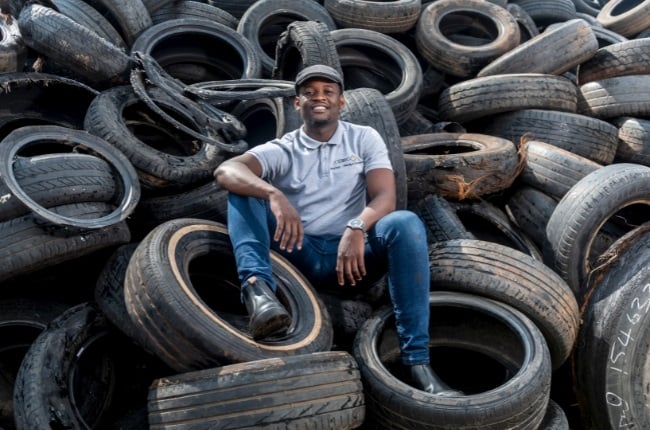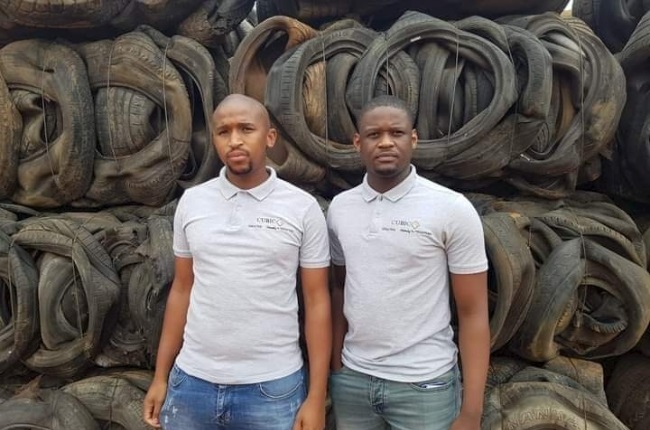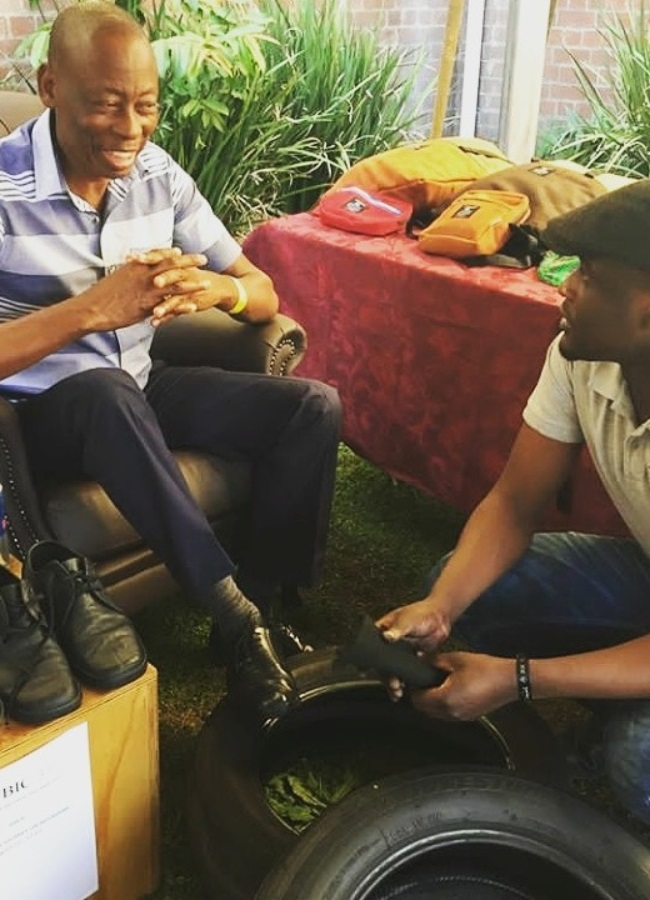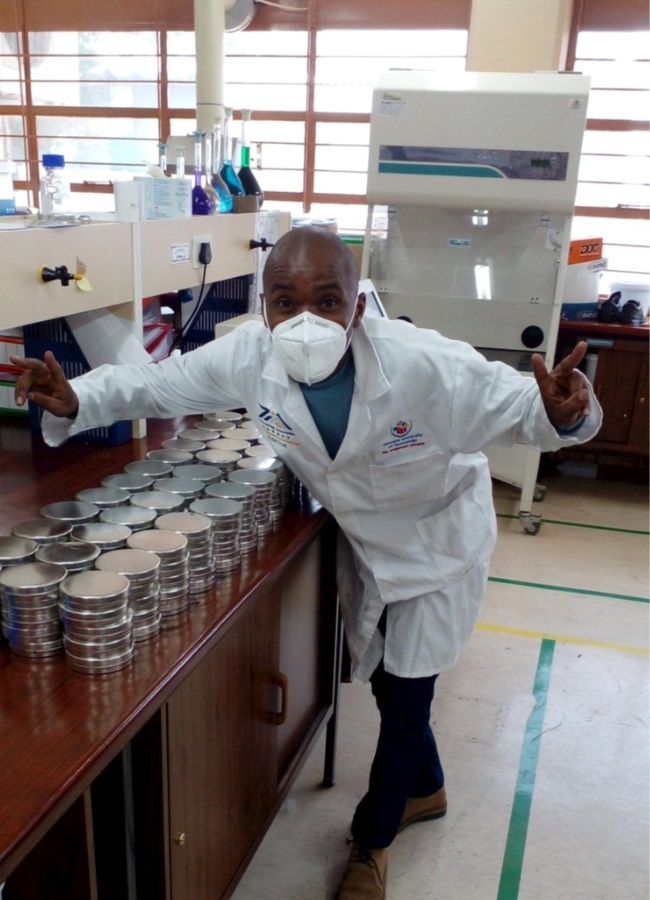
The trio of young men gazed at the mountain of discarded tyres – an eyesore and an environmental hazard to most people, but to them it was an opportunity to flex their entrepreneurial muscle.
Mzokhona Maxase (now 27), Tshepo Sithole (28) and Fortune Hadebe (27) were students at the Tshwane University of Technology (TUT) in Pretoria, but they were unable to attend classes due to protests at the university.
So, they went for a walk and paused outside Carbon Klean, a tyre recycling facility in Pretoria West.
“We went inside and the foreman showed us how they recycled tyres,” Mzokhona recalls.
“He told us their biggest challenge was what to do with the waste in the form of carbon char, the residual solid that remains after oil and steel has been removed from recycled tyres. And even though we weren’t science students, we’d already decided we wanted to play in the green economy space.”
The young men asked for a sample of the carbon char so they could study it – and a year later, their eco-friendly business, Cubic 38, was born.
The company’s name is derived from an equation for compressed natural gas, a cleaner alternative to diesel and petrol, and it uses the char as the main ingredient in shoe polish and tyre polish.
“Tyres aren’t waste, they’re a resource – if you know how to use them properly,” Mzokhona explains.
When he moved to Gauteng from Hluhluwe in rural KwaZulu-Natal, Mzokhona was shocked at the amount of waste he encountered.
“Valuable materials which could be upcycled into income-generating raw materials were labelled as waste materials. It opened my eyes to the reality, and I told myself I want to be involved in the growing market of the green space.”
He explains that carbon char, also called carbon black, is used to strengthen rubber in tyres and helps conduct heat away from the tread and belts of the tyres, which helps to increase the lifespan of the tyre.
Carbon black compounds also protect tyres from UV rays, which can shorten their lifespan. In its recycled form, it looks like a fine black powder.
South Africa’s tyre waste includes a stockpile of up to 100 million used tyres, with around 11 million more tyres added annually.
Unlike other waste products, like aluminium or glass, rubber tyres aren’t easy to recycle.
They also take up a lot of space and burning them releases dangerous toxins into the air.
“Through our products, we want to educate people about tyres and tell them to stop burning tyres,” Mzokhona says.
“We want people to know that there are eco-friendly companies that recycle tyres and produce new goods from the recovered materials.”
While Mzokhona and his friends were studying at TUT, they spent their free time dreaming about making a difference to a trash-clogged world.
“We’d often discuss potential business ideas and wondered how we could play a role in the green ecosystem,” Mzokhona recalls.
“We bonded because we are all like minded. We had no idea how to make it happen, but we believed it would happen eventually.”
And then the visit to the tyre plant happened and their brains started firing on all cylinders.
There had to be something they could do with carbon char, they decided, so they started looking around for guidance.
TUT didn’t have a chemical engineering department, but the department of innovation at the university hooked them up with engineering experts at Nelson Mandela University in Gqeberha.
“We didn’t know anything about carbon char, but with the help of one of the professors, we did our research,” Mzokhona says.
“And then we asked ourselves, ‘Why not car tyre and shoe polish?’ We developed this idea to return the char tyre waste back to tyres and also to shoes in the form of polish.”
The trio got support and funding from TUT’s innovation department and The Red Bull Amaphiko Academy, which supports grassroots social entrepreneurs.
The first three years of the business were spent on product development.
“Because this was a completely new idea, the market research took a long time because there weren’t any companies to use as references,” Mzokhona says.
Tshepo and Mzokhona worked at TUT to develop their first 1 200 units for sales and distribution.
“That was a milestone for us. It allowed us to distribute the products, because once we advertised what we were doing, people were keen to learn how it worked.”
“We’re grateful for the assistance we received from the innovation hub, the professors at TUT and NMU and the chemical engineering experts they put us in contact with,” he adds.
In 2020, they received a Greening the Future award for Sustainable Design from the Mail & Guardian.
“This was a big achievement for us. The pandemic caused sales to plummet, but this award gave our business the boost it needed.”
When the guys told their families they were launching a company to make polish out of tyre waste, they were sceptical at first.
“They asked us why we didn’t just get regular jobs,” Mzokhona says.
“But now that they’ve seen the recognition we’ve received, they’ve warmed up to it. We’re grateful for their support and motivation in completing what we do.”
Mzokhona has a bachelor’s degree in logistics, Tshepo has a national diploma in sports management, and Fortune has an honours degree in entrepreneurship.
Mzokhona handles logistics and the technical side of the business, Tshepo is responsible for consumer engagement and Fortune handles business development.
In their spare time, the trio often brainstorm other business ideas.
“There’s so much to do in the green space. We’ll watch soccer at the stadium, but then we’ll come across something that sparks a business conversation.”
Cubic 38 operates as an e-commerce business from the website infocubic38.co.za and delivers countrywide.
Each production run yields 250 units per day and each container of polish takes five minutes to create from start to finish.
The company operates from a factory in Ga-Rankuwa near Pretoria, which employs eight people.
Shoe polish and tyre shine are sold in 100ml containers and cost R40 each.
“We aren’t yet mass producing, so when that happens we’ll be able to lower the unit cost,” Mzokhona says.
“We aren’t telling people to deviate from what they are accustomed to, but we are saying choose an eco-friendly alternative that will make a cleaner environment for you and everyone else.”
The entrepreneurs hope to expand their operations and continue raising awareness of their products.
“These are only the first products we are working on. We want to keep expanding, innovating and finding other applications for waste products.”
ADDITIONAL SOURCES: IOL.CO.ZA, SOWETANLIVE.CO.ZA, BIZCOMMUNITY.COM, GREENFUTURE.MG.CO.ZA, REDBULL.COM, STARTUPMAG.CO.ZA, SUPAQUICK.COM




 Publications
Publications
 Partners
Partners




















